Level 5 Diploma Report: Challenges in Teaching Disabled Learners
VerifiedAdded on 2023/01/07
|5
|1057
|97
Report
AI Summary
This report addresses the challenges encountered when teaching disabled learners, focusing on issues such as learning difficulties, social and emotional problems, and curriculum considerations. It highlights the impact of these challenges on both students and educators, including social isolation, behavioral issues, and the need for specialized support. The report emphasizes the importance of understanding these challenges to improve the learning environment for disabled students and suggests focusing on enhancing the school atmosphere. It also discusses the role of educators, the impact of limited resources, and the need for effective strategies to address the specific needs of these learners. The report references relevant studies and provides a comprehensive overview of the complex issues involved in teaching disabled students.
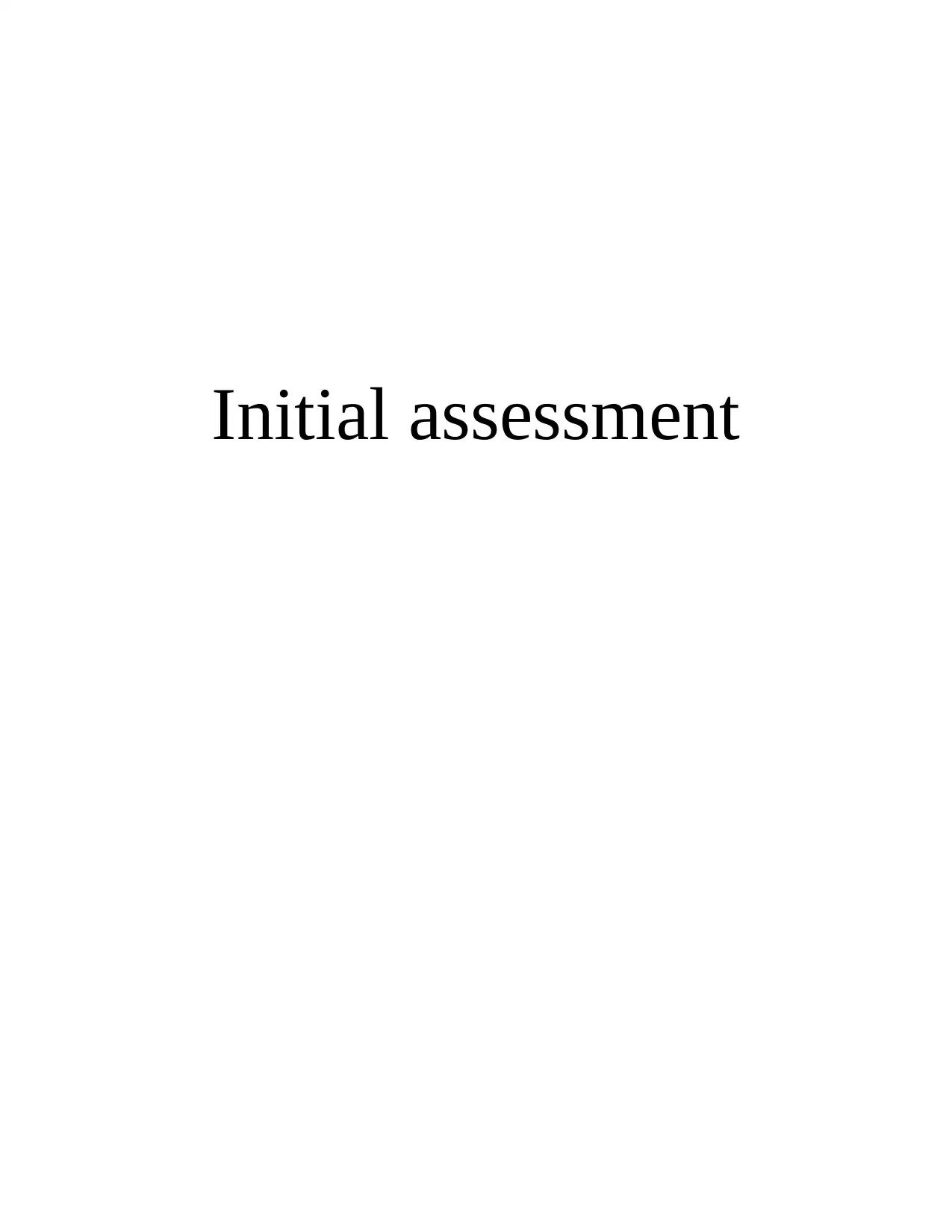
Initial assessment
Paraphrase This Document
Need a fresh take? Get an instant paraphrase of this document with our AI Paraphraser
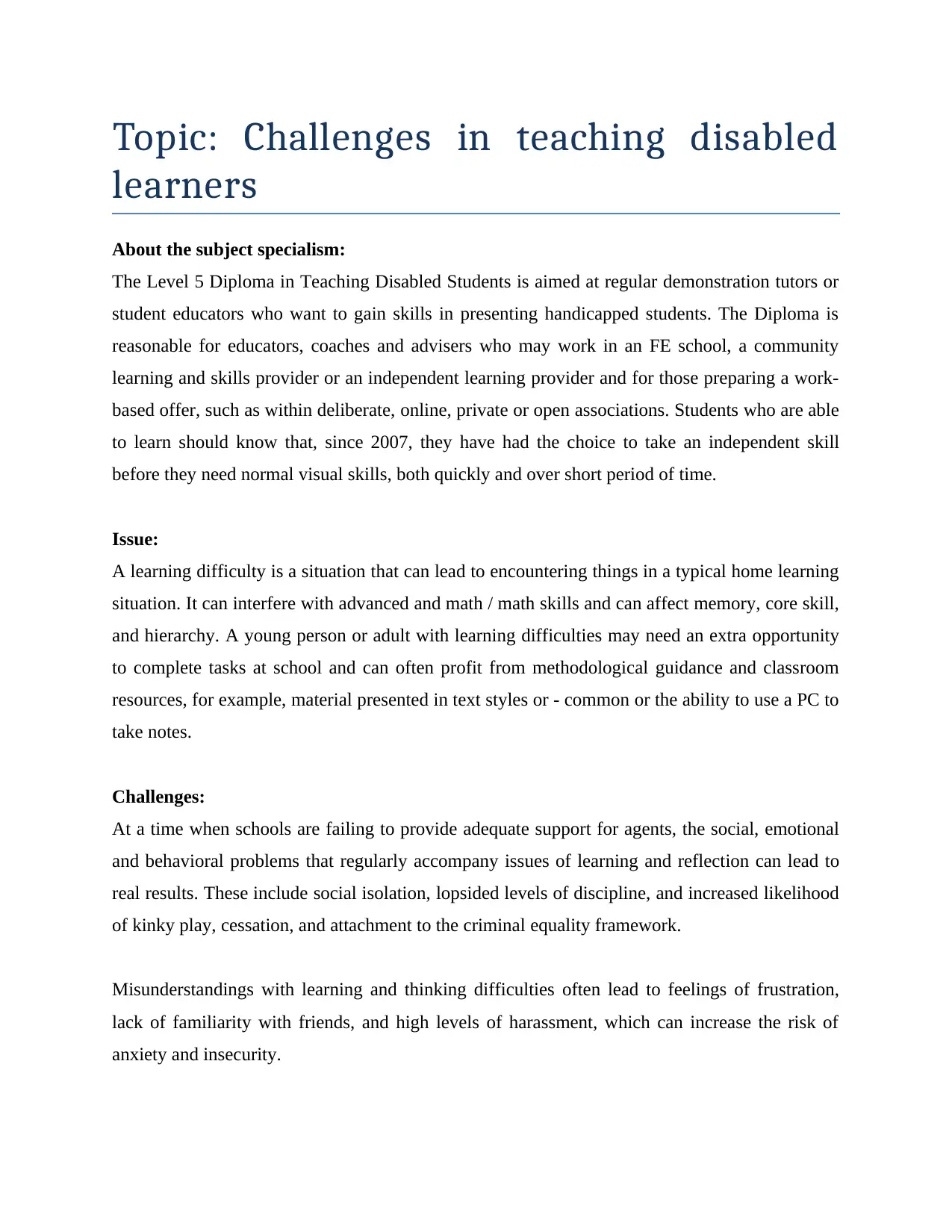
Topic: Challenges in teaching disabled
learners
About the subject specialism:
The Level 5 Diploma in Teaching Disabled Students is aimed at regular demonstration tutors or
student educators who want to gain skills in presenting handicapped students. The Diploma is
reasonable for educators, coaches and advisers who may work in an FE school, a community
learning and skills provider or an independent learning provider and for those preparing a work-
based offer, such as within deliberate, online, private or open associations. Students who are able
to learn should know that, since 2007, they have had the choice to take an independent skill
before they need normal visual skills, both quickly and over short period of time.
Issue:
A learning difficulty is a situation that can lead to encountering things in a typical home learning
situation. It can interfere with advanced and math / math skills and can affect memory, core skill,
and hierarchy. A young person or adult with learning difficulties may need an extra opportunity
to complete tasks at school and can often profit from methodological guidance and classroom
resources, for example, material presented in text styles or - common or the ability to use a PC to
take notes.
Challenges:
At a time when schools are failing to provide adequate support for agents, the social, emotional
and behavioral problems that regularly accompany issues of learning and reflection can lead to
real results. These include social isolation, lopsided levels of discipline, and increased likelihood
of kinky play, cessation, and attachment to the criminal equality framework.
Misunderstandings with learning and thinking difficulties often lead to feelings of frustration,
lack of familiarity with friends, and high levels of harassment, which can increase the risk of
anxiety and insecurity.
learners
About the subject specialism:
The Level 5 Diploma in Teaching Disabled Students is aimed at regular demonstration tutors or
student educators who want to gain skills in presenting handicapped students. The Diploma is
reasonable for educators, coaches and advisers who may work in an FE school, a community
learning and skills provider or an independent learning provider and for those preparing a work-
based offer, such as within deliberate, online, private or open associations. Students who are able
to learn should know that, since 2007, they have had the choice to take an independent skill
before they need normal visual skills, both quickly and over short period of time.
Issue:
A learning difficulty is a situation that can lead to encountering things in a typical home learning
situation. It can interfere with advanced and math / math skills and can affect memory, core skill,
and hierarchy. A young person or adult with learning difficulties may need an extra opportunity
to complete tasks at school and can often profit from methodological guidance and classroom
resources, for example, material presented in text styles or - common or the ability to use a PC to
take notes.
Challenges:
At a time when schools are failing to provide adequate support for agents, the social, emotional
and behavioral problems that regularly accompany issues of learning and reflection can lead to
real results. These include social isolation, lopsided levels of discipline, and increased likelihood
of kinky play, cessation, and attachment to the criminal equality framework.
Misunderstandings with learning and thinking difficulties often lead to feelings of frustration,
lack of familiarity with friends, and high levels of harassment, which can increase the risk of
anxiety and insecurity.
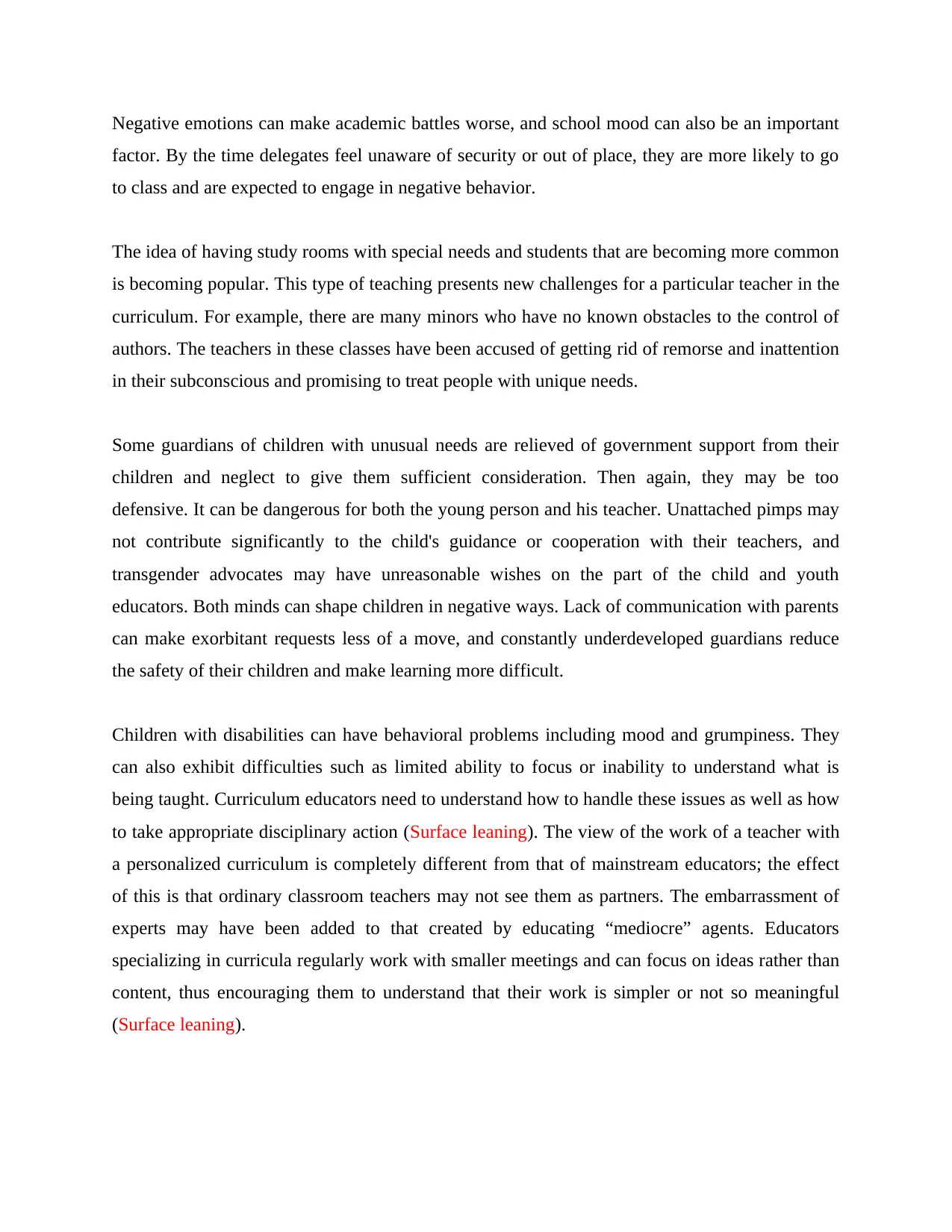
Negative emotions can make academic battles worse, and school mood can also be an important
factor. By the time delegates feel unaware of security or out of place, they are more likely to go
to class and are expected to engage in negative behavior.
The idea of having study rooms with special needs and students that are becoming more common
is becoming popular. This type of teaching presents new challenges for a particular teacher in the
curriculum. For example, there are many minors who have no known obstacles to the control of
authors. The teachers in these classes have been accused of getting rid of remorse and inattention
in their subconscious and promising to treat people with unique needs.
Some guardians of children with unusual needs are relieved of government support from their
children and neglect to give them sufficient consideration. Then again, they may be too
defensive. It can be dangerous for both the young person and his teacher. Unattached pimps may
not contribute significantly to the child's guidance or cooperation with their teachers, and
transgender advocates may have unreasonable wishes on the part of the child and youth
educators. Both minds can shape children in negative ways. Lack of communication with parents
can make exorbitant requests less of a move, and constantly underdeveloped guardians reduce
the safety of their children and make learning more difficult.
Children with disabilities can have behavioral problems including mood and grumpiness. They
can also exhibit difficulties such as limited ability to focus or inability to understand what is
being taught. Curriculum educators need to understand how to handle these issues as well as how
to take appropriate disciplinary action (Surface leaning). The view of the work of a teacher with
a personalized curriculum is completely different from that of mainstream educators; the effect
of this is that ordinary classroom teachers may not see them as partners. The embarrassment of
experts may have been added to that created by educating “mediocre” agents. Educators
specializing in curricula regularly work with smaller meetings and can focus on ideas rather than
content, thus encouraging them to understand that their work is simpler or not so meaningful
(Surface leaning).
factor. By the time delegates feel unaware of security or out of place, they are more likely to go
to class and are expected to engage in negative behavior.
The idea of having study rooms with special needs and students that are becoming more common
is becoming popular. This type of teaching presents new challenges for a particular teacher in the
curriculum. For example, there are many minors who have no known obstacles to the control of
authors. The teachers in these classes have been accused of getting rid of remorse and inattention
in their subconscious and promising to treat people with unique needs.
Some guardians of children with unusual needs are relieved of government support from their
children and neglect to give them sufficient consideration. Then again, they may be too
defensive. It can be dangerous for both the young person and his teacher. Unattached pimps may
not contribute significantly to the child's guidance or cooperation with their teachers, and
transgender advocates may have unreasonable wishes on the part of the child and youth
educators. Both minds can shape children in negative ways. Lack of communication with parents
can make exorbitant requests less of a move, and constantly underdeveloped guardians reduce
the safety of their children and make learning more difficult.
Children with disabilities can have behavioral problems including mood and grumpiness. They
can also exhibit difficulties such as limited ability to focus or inability to understand what is
being taught. Curriculum educators need to understand how to handle these issues as well as how
to take appropriate disciplinary action (Surface leaning). The view of the work of a teacher with
a personalized curriculum is completely different from that of mainstream educators; the effect
of this is that ordinary classroom teachers may not see them as partners. The embarrassment of
experts may have been added to that created by educating “mediocre” agents. Educators
specializing in curricula regularly work with smaller meetings and can focus on ideas rather than
content, thus encouraging them to understand that their work is simpler or not so meaningful
(Surface leaning).
⊘ This is a preview!⊘
Do you want full access?
Subscribe today to unlock all pages.

Trusted by 1+ million students worldwide
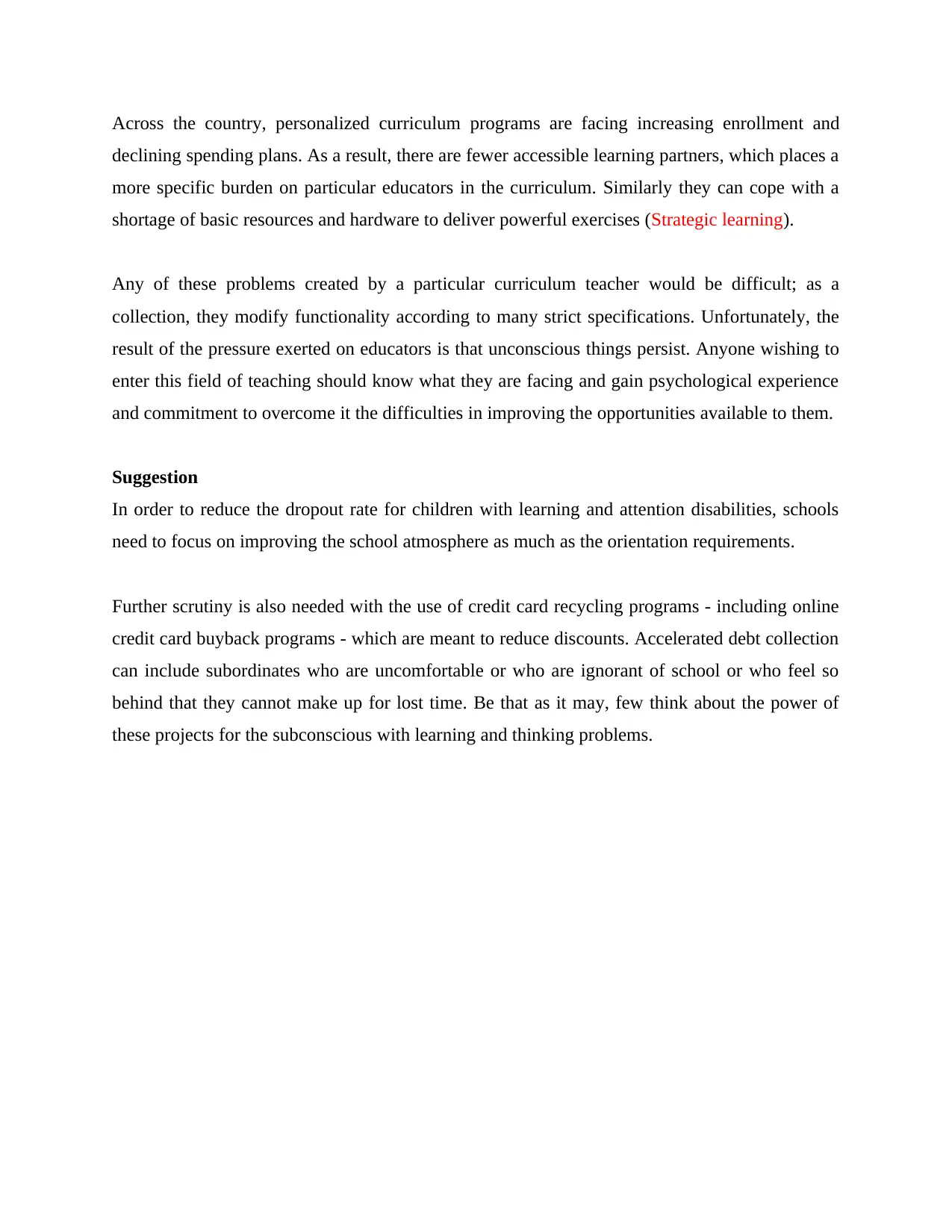
Across the country, personalized curriculum programs are facing increasing enrollment and
declining spending plans. As a result, there are fewer accessible learning partners, which places a
more specific burden on particular educators in the curriculum. Similarly they can cope with a
shortage of basic resources and hardware to deliver powerful exercises (Strategic learning).
Any of these problems created by a particular curriculum teacher would be difficult; as a
collection, they modify functionality according to many strict specifications. Unfortunately, the
result of the pressure exerted on educators is that unconscious things persist. Anyone wishing to
enter this field of teaching should know what they are facing and gain psychological experience
and commitment to overcome it the difficulties in improving the opportunities available to them.
Suggestion
In order to reduce the dropout rate for children with learning and attention disabilities, schools
need to focus on improving the school atmosphere as much as the orientation requirements.
Further scrutiny is also needed with the use of credit card recycling programs - including online
credit card buyback programs - which are meant to reduce discounts. Accelerated debt collection
can include subordinates who are uncomfortable or who are ignorant of school or who feel so
behind that they cannot make up for lost time. Be that as it may, few think about the power of
these projects for the subconscious with learning and thinking problems.
declining spending plans. As a result, there are fewer accessible learning partners, which places a
more specific burden on particular educators in the curriculum. Similarly they can cope with a
shortage of basic resources and hardware to deliver powerful exercises (Strategic learning).
Any of these problems created by a particular curriculum teacher would be difficult; as a
collection, they modify functionality according to many strict specifications. Unfortunately, the
result of the pressure exerted on educators is that unconscious things persist. Anyone wishing to
enter this field of teaching should know what they are facing and gain psychological experience
and commitment to overcome it the difficulties in improving the opportunities available to them.
Suggestion
In order to reduce the dropout rate for children with learning and attention disabilities, schools
need to focus on improving the school atmosphere as much as the orientation requirements.
Further scrutiny is also needed with the use of credit card recycling programs - including online
credit card buyback programs - which are meant to reduce discounts. Accelerated debt collection
can include subordinates who are uncomfortable or who are ignorant of school or who feel so
behind that they cannot make up for lost time. Be that as it may, few think about the power of
these projects for the subconscious with learning and thinking problems.
Paraphrase This Document
Need a fresh take? Get an instant paraphrase of this document with our AI Paraphraser
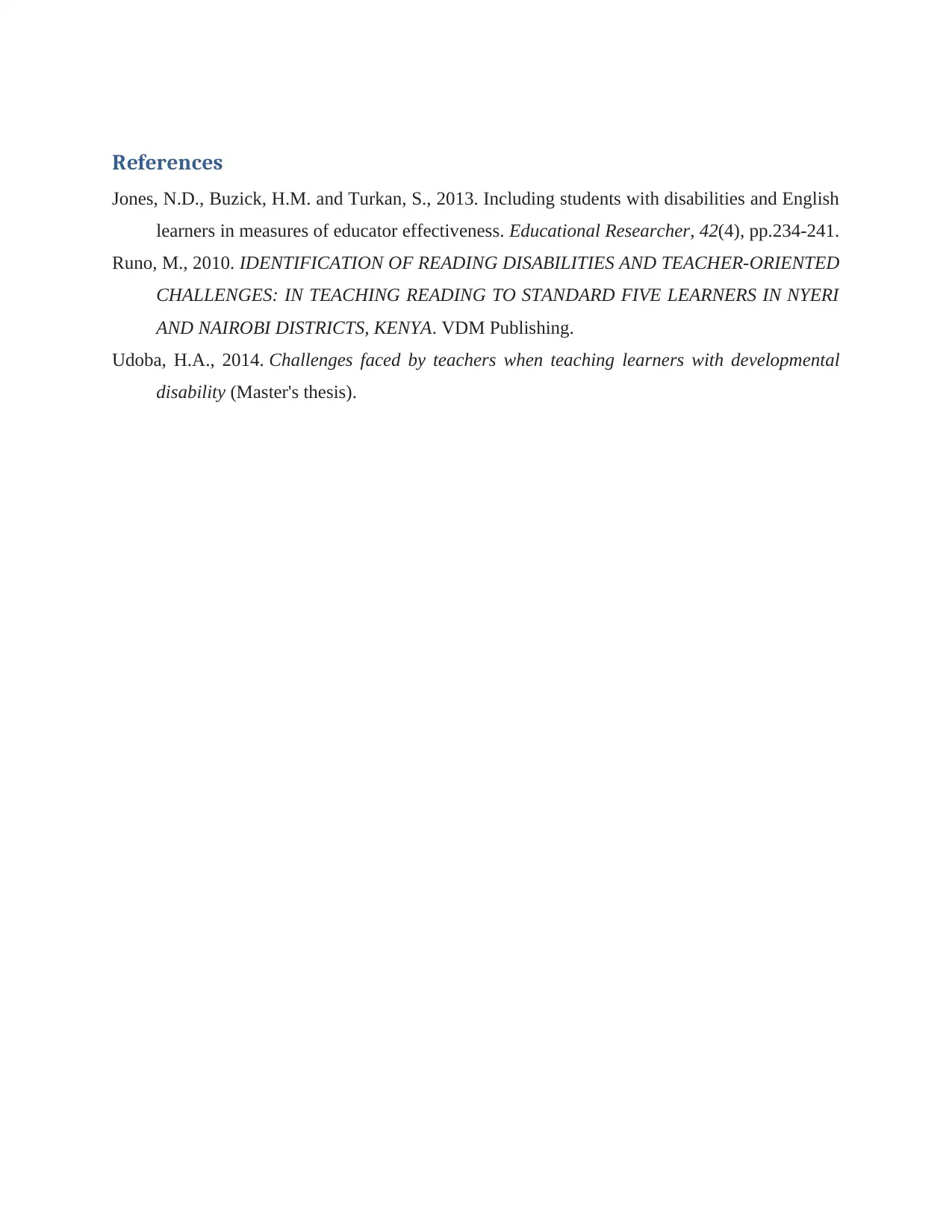
References
Jones, N.D., Buzick, H.M. and Turkan, S., 2013. Including students with disabilities and English
learners in measures of educator effectiveness. Educational Researcher, 42(4), pp.234-241.
Runo, M., 2010. IDENTIFICATION OF READING DISABILITIES AND TEACHER-ORIENTED
CHALLENGES: IN TEACHING READING TO STANDARD FIVE LEARNERS IN NYERI
AND NAIROBI DISTRICTS, KENYA. VDM Publishing.
Udoba, H.A., 2014. Challenges faced by teachers when teaching learners with developmental
disability (Master's thesis).
Jones, N.D., Buzick, H.M. and Turkan, S., 2013. Including students with disabilities and English
learners in measures of educator effectiveness. Educational Researcher, 42(4), pp.234-241.
Runo, M., 2010. IDENTIFICATION OF READING DISABILITIES AND TEACHER-ORIENTED
CHALLENGES: IN TEACHING READING TO STANDARD FIVE LEARNERS IN NYERI
AND NAIROBI DISTRICTS, KENYA. VDM Publishing.
Udoba, H.A., 2014. Challenges faced by teachers when teaching learners with developmental
disability (Master's thesis).
1 out of 5
Related Documents
Your All-in-One AI-Powered Toolkit for Academic Success.
+13062052269
info@desklib.com
Available 24*7 on WhatsApp / Email
![[object Object]](/_next/static/media/star-bottom.7253800d.svg)
Unlock your academic potential
Copyright © 2020–2026 A2Z Services. All Rights Reserved. Developed and managed by ZUCOL.





